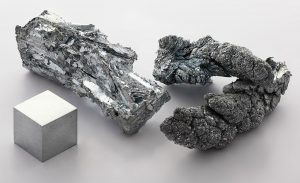Multivitamins frequently include zinc for its wide range of life-essential functions.

- Aiding enzymes. Zinc-dependent enzymes facilitate numerous processes in the body, including protein and DNA synthesis, immunity, and wound healing.
- Regulating gene expression. Zinc influences the transcription of genes, which affects growth and cell signaling.
Overview
Zinc is an element and essential trace mineral involved in many biological processes, including immunity, brain function, protein and DNA synthesis, and reproduction. Similar to magnesium, most of these functions are mediated by zinc’s role in the proper functioning of over 300 different enzymes.
Zinc deficiency is rare in the developed world, but is estimated to affect as many as 2 billion people worldwide.1 Abundant quantities of zinc are available in everyday foods, with especially high amounts in shellfish, eggs, and red meat.
Recommended Dietary Allowances (RDAs) for Zinc
| Age | Males | Females |
| 0 – 12 months | 2 – 3 mg | 2 – 3 mg |
| 1 – 8 years | 3 – 5 mg | 3 – 5 mg |
| 9 – 13 years | 8 mg | 8 mg |
| 14 – 18 years | 11 mg | 9 mg (12 mg for pregnancy, 13 mg for breast-feeding) |
| 19+ | 11 mg | 8 mg (11 mg for pregnancy, 12 mg for breast-feeding) |
Foods High in Zinc
| Food | Serving Size | Amount per serving (mg) |
| Oysters (cooked) | 6 oysters | 27 – 50 |
| Beef | 3 ounces | 3.7 – 5.8 |
| Beans (baked) | ½ cup | 0.9 – 2.9 |
| Yogurt | 8 ounces | 1.8 |
| Cashews | 1 ounce | 1.6 |
| Cheese | 1 ounce | 0.9 |

How Zinc Might Help with General Health
The capacity of zinc to impact numerous bodily processes stems from its vital role in:
Facilitating enzyme function
Zinc is required for the proper function of enzymes involved in a wide range of processes, including:3
- Immune function, especially leukocytes and T-helper cells that protect the body4 5
- DNA and protein synthesis
- Wound healing
- Cell division
- Taste
Regulating gene expression
By managing the first step of gene expression (transcription), zinc has a major impact on:
- Pre and postnatal growth and development6 7
- Cellular signaling8
- Hormone release, including testosterone synthesis
- Nerve transmission
Zinc’s Benefits as a Multivitamin

Beyond this, zinc may also help with age-related macular degeneration, especially when paired with antioxidants.9 More on zinc for vision.
Multivitamin Dosage
- Multivitamins typically include 10 – 15 mg of zinc as zinc oxide or zinc citrate
- Health professionals recommend taking no more than 40 mg of zinc per day
Supplements in Review Says
- Zinc 8-11 mg as part of a multivitamin.
Zinc is essential to the proper functioning of the body. Zinc is necessary for a wide range of vital processes such as protein and DNA synthesis, immune function, wound healing, growth, cellular signaling, and hormone release.
Look for a multivitamin with at least the RDA dose. Multivitamins containing RDA doses (8 mg for women and 11 mg for men) are sufficient to be sure you’re getting plenty of zinc.
Leave a Reply